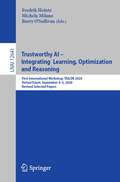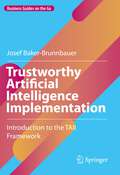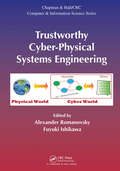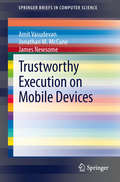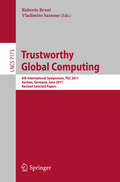- Table View
- List View
Trusted Web 4.0 - Konzepte einer digitalen Gesellschaft: Konzepte der Dezentralisierung und Anonymisierung (Xpert.press)
by Olaf BerberichDer Autor erläutert organisatorische Voraussetzungen für Unternehmen, um einen funktionierenden Datenschutz herzustellen. Angesichts der Tatsache, dass Millionen von personenbezogenen Daten von zentralisierten Portalen gestohlen oder dass Millionen von Fahrzeugen mit der gleichen Software manipuliert werden, ist es erforderlich, dass Chancen skalierbarer Geschäftsmodelle von skalierbaren Risiken abgekoppelt werden, um Wirtschaftsbereiche zu sichern und zu stabilisieren.Das Buch richtet sich an alle, die die digitale Transformation mitgestalten wollen. In einem interdisziplinären ganzheitlichen Prozess muss ein Paradigmenwechsel stattfinden, damit Risiken so überschaubar wie in der vordigitalen Welt werden. Insbesondere sind dabei Konzepte der Dezentralisierung und Anonymisierung zu berücksichtigen.
Trusting Agents for Trusting Electronic Societies: Theory and Applications in HCI and E-Commerce (Lecture Notes in Computer Science #3577)
by Rino Falcone Suzanne Barber Jordi Sabater-Mir Munindar SinghBased on two international workshops on trust in agent societies, held at AAMAS 2003 and AAMAS 2004, this book draws together carefully revised papers on trust, reputation, and security in agent society. Besides workshop papers, several contributions from leading researchers in this interdisciplinary field were solicited to complete coverage of all relevant topics. The 13 papers presented take into account issues from multiagent systems, artificial intelligence, cognitive science, game theory, and social and organizational science. Theoretical topics are addressed as well as applications in human-computer interaction and e-commerce.
Trustworthy AI: A Business Guide for Navigating Trust and Ethics in AI
by Beena AmmanathAn essential resource on artificial intelligence ethics for business leaders In Trustworthy AI, award-winning executive Beena Ammanath offers a practical approach for enterprise leaders to manage business risk in a world where AI is everywhere by understanding the qualities of trustworthy AI and the essential considerations for its ethical use within the organization and in the marketplace. The author draws from her extensive experience across different industries and sectors in data, analytics and AI, the latest research and case studies, and the pressing questions and concerns business leaders have about the ethics of AI. Filled with deep insights and actionable steps for enabling trust across the entire AI lifecycle, the book presents: In-depth investigations of the key characteristics of trustworthy AI, including transparency, fairness, reliability, privacy, safety, robustness, and more A close look at the potential pitfalls, challenges, and stakeholder concerns that impact trust in AI application Best practices, mechanisms, and governance considerations for embedding AI ethics in business processes and decision making Written to inform executives, managers, and other business leaders, Trustworthy AI breaks new ground as an essential resource for all organizations using AI.
Trustworthy AI: A Business Guide for Navigating Trust and Ethics in AI
by Beena AmmanathAn essential resource on artificial intelligence ethics for business leaders In Trustworthy AI, award-winning executive Beena Ammanath offers a practical approach for enterprise leaders to manage business risk in a world where AI is everywhere by understanding the qualities of trustworthy AI and the essential considerations for its ethical use within the organization and in the marketplace. The author draws from her extensive experience across different industries and sectors in data, analytics and AI, the latest research and case studies, and the pressing questions and concerns business leaders have about the ethics of AI. Filled with deep insights and actionable steps for enabling trust across the entire AI lifecycle, the book presents: In-depth investigations of the key characteristics of trustworthy AI, including transparency, fairness, reliability, privacy, safety, robustness, and more A close look at the potential pitfalls, challenges, and stakeholder concerns that impact trust in AI application Best practices, mechanisms, and governance considerations for embedding AI ethics in business processes and decision making Written to inform executives, managers, and other business leaders, Trustworthy AI breaks new ground as an essential resource for all organizations using AI.
Trustworthy AI - Integrating Learning, Optimization and Reasoning: First International Workshop, TAILOR 2020, Virtual Event, September 4–5, 2020, Revised Selected Papers (Lecture Notes in Computer Science #12641)
by Fredrik Heintz Michela Milano Barry O’SullivanThis book constitutes the thoroughly refereed conference proceedings of the First International Workshop on the Foundation of Trustworthy AI - Integrating Learning, Optimization and Reasoning, TAILOR 2020, held virtually in September 2020, associated with ECAI 2020, the 24th European Conference on Artificial Intelligence. The 11 revised full papers presented together with 6 short papers and 6 position papers were reviewed and selected from 52 submissions. The contributions address various issues for Trustworthiness, Learning, reasoning, and optimization, Deciding and Learning How to Act, AutoAI, and Reasoning and Learning in Social Contexts.
Trustworthy Artificial Intelligence for Healthcare: Second International Workshop, TAI4H 2024, Jeju, South Korea, August 4, 2024, Proceedings (Lecture Notes in Computer Science #14812)
by Daguang Xu Hao Chen Yuyin Zhou Varut Vince VardhanabhutiThis book constitutes the proceedings of Second International Workshop on Trustworthy Artificial Intelligence for Healthcare, TAI4H 2024, held in Jeju, South Korea, in August 2024, in conjunction with the International Joint Conference on Artificial Intelligence, IJCAI 2024. The 13 full papers included in this book were carefully reviewed and selected from 21 submissions. They focus on trustworthy artificial intelligence, healthcare, generalization, explainability, fairness, privacy, multi-modal fusion, foundation models.
Trustworthy Artificial Intelligence Implementation: Introduction to the TAII Framework (Business Guides on the Go)
by Josef Baker-BrunnbauerRapidly developing Artificial Intelligence (AI) systems hold tremendous potential to change various domains and exert considerable influence on societies and organizations alike. More than merely a technical discipline, AI requires interaction between various professions. Based on the results of fundamental literature and empirical research, this book addresses the management’s awareness of the ethical and moral aspects of AI. It seeks to fill a literature gap and offer the management guidance on tackling Trustworthy AI Implementation (TAII) while also considering ethical dependencies within the company. The TAII Framework introduced here pursues a holistic approach to identifying systemic ethical relationships within the company ecosystem and considers corporate values, business models, and common goods aspects like the Sustainable Development Goals and the Universal Declaration of Human Rights. Further, it provides guidance on the implementation of AI ethics in organisations without requiring a deeper background in philosophy and considers the social impacts outside of the software and data engineering setting. Depending on the respective legal context or area of application, the TAII Framework can be adapted and used with a range of regulations and ethical principles. This book can serve as a case study or self-review for c-level managers and students who are interested in this field. It also offers valuable guidelines and perspectives for policymakers looking to pursue an ethical approach to AI.
Trustworthy Cloud Computing (Wiley - IEEE)
by Vladimir O. SafonovIntroduces the topic of cloud computing with an emphasis on the trustworthiness of cloud computing systems and services This book describes the scientific basis of cloud computing, explaining the ideas, principles, and architectures of cloud computing as well the different types of clouds and the services they provide. The text reviews several cloud computing platforms, including Microsoft Azure, Amazon, Oracle, Google, HP, IBM, Salesforce, and Kaavo. The author addresses the problem of trustworthiness in cloud computing and provides methods to improve the security and privacy of cloud applications. The end-of-chapter exercises and supplementary material on the book's companion website will allow readers to grasp the introductory and advanced level concepts of cloud computing. Examines cloud computing platforms such as Microsoft Azure, Amazon, Oracle, Google, HP, IBM, Salesforce, and Kaavo Analyzes the use of aspect-oriented programming (AOP) for refactoring cloud services and improving the security and privacy of cloud applications Contains practical examples of cloud computing, test questions, and end-of-chapter exercises Includes presentations, examples of cloud projects and other teaching resources at the author’s website (http://www.vladimirsafonov.org/cloud) Trustworthy Cloud Computing is written for advanced undergraduate and graduate students in computer science, data science, and computer engineering as well as software engineers, system architects, system managers, and software developers new to cloud computing.
Trustworthy Cloud Computing (Wiley - IEEE)
by Vladimir O. SafonovIntroduces the topic of cloud computing with an emphasis on the trustworthiness of cloud computing systems and services This book describes the scientific basis of cloud computing, explaining the ideas, principles, and architectures of cloud computing as well the different types of clouds and the services they provide. The text reviews several cloud computing platforms, including Microsoft Azure, Amazon, Oracle, Google, HP, IBM, Salesforce, and Kaavo. The author addresses the problem of trustworthiness in cloud computing and provides methods to improve the security and privacy of cloud applications. The end-of-chapter exercises and supplementary material on the book's companion website will allow readers to grasp the introductory and advanced level concepts of cloud computing. Examines cloud computing platforms such as Microsoft Azure, Amazon, Oracle, Google, HP, IBM, Salesforce, and Kaavo Analyzes the use of aspect-oriented programming (AOP) for refactoring cloud services and improving the security and privacy of cloud applications Contains practical examples of cloud computing, test questions, and end-of-chapter exercises Includes presentations, examples of cloud projects and other teaching resources at the author’s website (http://www.vladimirsafonov.org/cloud) Trustworthy Cloud Computing is written for advanced undergraduate and graduate students in computer science, data science, and computer engineering as well as software engineers, system architects, system managers, and software developers new to cloud computing.
Trustworthy Communications and Complete Genealogies: Unifying Ancestries for a Genealogical History of the Modern World (Synthesis Lectures on Information Concepts, Retrieval, and Services)
by Reagan W. MooreGenealogies document relationships between persons involved in historical events. Information about the events is parsed from communications from the past. This book explores a way to organize information from multiple communications into a trustworthy representation of a genealogical history of the modern world. The approach defines metrics for evaluating the consistency, correctness, closure, connectivity, completeness, and coherence of a genealogy. The metrics are evaluated using a 312,000-person research genealogy that explores the common ancestors of the royal families of Europe. A major result is that completeness is defined by a genealogy symmetry property driven by two exponential processes, the doubling of the number of potential ancestors each generation, and the rapid growth of lineage coalescence when the number of potential ancestors exceeds the available population. A genealogy expands from an initial root person to a large number of lineages, which then coalesce into a small number of progenitors. Using the research genealogy, candidate progenitors for persons of Western European descent are identified. A unifying ancestry is defined to which historically notable persons can be linked.
Trustworthy Communications and Complete Genealogies: Unifying Ancestries for a Genealogical History of the Modern World (Synthesis Lectures on Information Concepts, Retrieval, and Services)
by Reagan W. MooreThis book discusses how a genealogical history of the modern world can be created by linking the Royal Families of Western Europeans database to Unifying Ancestry. This new edition extends the original analysis by including a coherence metric to evaluate the content of the Unifying Ancestry database, which is freely available online educational software within the CoreGen3 analysis workbench. The author discusses why common ancestors of the Royal Families of Western Europe comprise an optimal Unifying Ancestry experience and further illustrates this by using historically influential people as examples. Specifically, algorithms for validating the Unifying Ancestry are applied to a 330,000-person Research Genealogy and then used to link to historical royal descendants. Genealogical evaluation properties for consistency, correctness, closure, connectivity, completeness and coherence are demonstrated. These properties are applied to a Research Genealogy to generate a unifying ancestry for western Europeans. The unifying ancestry is then used to create a genealogical history of the modern world. All the analyses can be reproduced by readers using the Unifying Ancestry CoreGen3 program.
Trustworthy Communications and Complete Genealogies: Unifying Ancestries for a Genealogical History of the Modern World (Synthesis Lectures on Information Concepts, Retrieval, and Services)
by Reagan W. MooreThis book explains how all persons with Western European ancestry are related through a Unifying Ancestry. The author presents the knowledge metrics needed to derive the best representation for a Unifying Ancestry. The book uses example lineages to historically notable persons including relationships to U.S. Presidents, royal families, actors, and singers in order to demonstrate these points. This third edition is based upon expanded data, applying the algorithms to validate the Unifying Ancestry to a 348,844-person Research Genealogy. The author successfully demonstrates that a Unifying Ancestry with 38,533 persons is sufficient to identify familial relationships between Western Europeans.
Trustworthy Compilers (Quantitative Software Engineering Series #8)
by Vladimir O. SafonovThis unique guide book explains and teaches the concept of trustworthy compilers based on 50+ years of worldwide experience in the area of compilers, and on the author’s own 30+ years of expertise in development and teaching compilers. It covers the key topics related to compiler development as well as compiling methods not thoroughly covered in other books. The book also reveals many state-of-the-art compiler development tools and personal experience of their use in research projects by the author and his team. Software engineers of commercial companies and undergraduate/graduate students will benefit from this guide.
Trustworthy Computing and Services: International Conference, ISCTCS 2014, Beijing, China, November 28-29, 2014, Revised Selected papers (Communications in Computer and Information Science #520)
by Yueming Lu Xu Wu Xi ZhangThis book constitutes the refereed proceedings of the International Standard Conference on Trustworthy Computing and Services, ISCTCS 2014, held in Beijing, China, in November 2014. The 51 revised full papers presented were carefully reviewed and selected from 279 submissions. The topics covered are architecture for trusted computing systems; trusted computing platform; trusted system building; network and protocol security; mobile network security; network survivability, other critical theories and standard systems; credible assessment; credible measurement and metrics; trusted systems; trusted networks; trusted mobile networks; trusted routing; trusted software; trusted operating systems; trusted storage; fault-tolerant computing and other key technologies; trusted e-commerce and e-government; trusted logistics; trusted internet of things; trusted cloud and other trusted services and applications.
Trustworthy Computing and Services: International Conference, ISCTCS 2013, Beijing, China, November 2013, Revised Selected Papers (Communications in Computer and Information Science #426)
by Yuyu Yuan Xu Wu Yueming LuThis book constitutes the refereed proceedings of the International Standard Conference on Trustworthy Distributed Computing and Services, ISCTCS 2013, held in Beijing, China, in November 2013. The 49 revised full papers presented were carefully reviewed and selected from 267 papers. The topics covered are trustworthy infrastructure; security, survivability and fault tolerance; standards, evaluation and certification; trustworthiness of services.
Trustworthy Computing and Services: International Conference, ISCTCS 2012, Beijing, China, May/June 2012, Revised Selected Papers (Communications in Computer and Information Science #320)
by Yuyu Yuan Xu Wu Yueming LuThis book constitutes the refereed proceedings of the International Standard Conference on Trustworthy Distributed Computing and Services, ISCTCS 2012, held in Beijing, China, in May/June 2012. The 92 revised full papers presented were carefully reviewed and selected from 278 papers. The topics covered are architecture for trusted computing systems, trusted computing platform, trusted systems build, network and protocol security, mobile network security, network survivability and other critical theories and standard systems, credible assessment, credible measurement and metrics, trusted systems, trusted networks, trusted mobile network, trusted routing, trusted software, trusted operating systems, trusted storage, fault-tolerant computing and other key technologies, trusted e-commerce and e-government, trusted logistics, trusted internet of things, trusted cloud and other trusted services and applications.
Trustworthy Cyber-Physical Systems: A Systematic Framework towards Design and Evaluation of Trust and Trustworthiness
by Nazila Gol MohammadiTrustworthiness is a key success factor in the acceptance and adoption of cyber-physical systems. The author first discusses various existing definitions of trust and trustworthiness and extends them to cyber-physical systems. A comprehensive framework is proposed, including methods that cover all phases of development: requirements engineering, system design, trustworthiness evaluation, run-time maintenance, and evidence-based assurance. To support a smooth integration of the methods into development projects, these methods are provided in the form of so-called capability patterns. A running example from the ambient assisted living domain is used to demonstrate the application of the methods.About the Author:Nazila Gol Mohammadi is currently working as an associate researcher at paluno – The Ruhr Institute for Software Technology in Essen, Germany. Her research interests include software engineering, requirements engineering, digitalization, cloud computing, cyber-physical systems, and trustworthiness of software systems.
Trustworthy Cyber-Physical Systems Engineering (Chapman & Hall/CRC Computer and Information Science Series)
by Alexander Romanovsky Fuyuki IshikawaFrom the Foreword "Getting CPS dependability right is essential to forming a solid foundation for a world that increasingly depends on such systems. This book represents the cutting edge of what we know about rigorous ways to ensure that our CPS designs are trustworthy. I recommend it to anyone who wants to get a deep look at these concepts that will form a cornerstone for future CPS designs." --Phil Koopman, Carnegie Mellon University, Pittsburgh, Pennsylvania, USA Trustworthy Cyber-Physical Systems Engineering provides practitioners and researchers with a comprehensive introduction to the area of trustworthy Cyber Physical Systems (CPS) engineering. Topics in this book cover questions such as What does having a trustworthy CPS actually mean for something as pervasive as a global-scale CPS? How does CPS trustworthiness map onto existing knowledge, and where do we need to know more? How can we mathematically prove timeliness, correctness, and other essential properties for systems that may be adaptive and even self-healing? How can we better represent the physical reality underlying real-world numeric quantities in the computing system? How can we establish, reason about, and ensure trust between CPS components that are designed, installed, maintained, and operated by different organizations, and which may never have really been intended to work together? Featuring contributions from leading international experts, the book contains sixteen self-contained chapters that analyze the challenges in developing trustworthy CPS, and identify important issues in developing engineering methods for CPS. The book addresses various issues contributing to trustworthiness complemented by contributions on TCSP roadmapping, taxonomy, and standardization, as well as experience in deploying advanced system engineering methods in industry. Specific approaches to ensuring trustworthiness, namely, proof and refinement, are covered, as well as engineering methods for dealing with hybrid aspects.
Trustworthy Eternal Systems via Evolving Software, Data and Knowledge: Second International Workshop, EternalS 2012, Montpellier, France, August 28, 2012, Revised Selected Papers (Communications in Computer and Information Science #379)
by Alessandro Moschitti Barbara PlankThis book constitutes the thoroughly refereed proceedings of the Second International Workshop on Trustworthy Eternal Systems via Evolving Software, Data and Knowledge, EternalS, held in Montpellier, France, in August 2012 and co-located with the 20th European Conference on Artificial Intelligence (ECAI 2012). The 10 revised full papers presented were carefully reviewed and selected from various submissions. The papers are organized into three main sections: natural language processing (NLP) for software systems, machine learning for software systems, roadmap for future research.
Trustworthy Execution on Mobile Devices (SpringerBriefs in Computer Science)
by Amit Vasudevan Jonathan M. McCune James NewsomeThis brief considers the various stakeholders in today's mobile device ecosystem, and analyzes why widely-deployed hardware security primitives on mobile device platforms are inaccessible to application developers and end-users. Existing proposals are also evaluated for leveraging such primitives, and proves that they can indeed strengthen the security properties available to applications and users, without reducing the properties currently enjoyed by OEMs and network carriers. Finally, this brief makes recommendations for future research that may yield practical and deployable results.
Trustworthy Federated Learning: First International Workshop, FL 2022, Held in Conjunction with IJCAI 2022, Vienna, Austria, July 23, 2022, Revised Selected Papers (Lecture Notes in Computer Science #13448)
by Randy Goebel Han Yu Boi Faltings Lixin Fan Zehui XiongThis book constitutes the refereed proceedings of the First International Workshop, FL 2022, Held in Conjunction with IJCAI 2022, held in Vienna, Austria, during July 23-25, 2022. The 11 full papers presented in this book were carefully reviewed and selected from 12 submissions. They are organized in three topical sections: answer set programming; adaptive expert models for personalization in federated learning and privacy-preserving federated cross-domain social recommendation.
Trustworthy Global Computing: Third Symposium, TGC 2007, Sophia-Antipolis, France, November 5-6, 2007, Revised Selected Papers (Lecture Notes in Computer Science #4912)
by Gilles Barthe Cédric FournetTrustworthy Global Computing: 6th International Symposium, TGC 2011, Aachen, Germany, June 9-10, 2011. Revised Selected Papers (Lecture Notes in Computer Science #7173)
by Roberto Bruni Vladimiro SassoneThis book constitutes the refereed proceedings of the 6th International Symposium on Trustworthy Global Computing, TGC 2011, held in Aachen, Germany, in June 2011. The 14 revised full papers presented were carefully reviewed and selected from 25 submissions. The papers are organized in topical sections on modeling formalisms for concurrent systems; model checking and quantitative extensions thereof; semantics and analysis of modern programming languages; probabilistic models for concurrency; and testing and run-time verification.
Trustworthy Global Computing: 10th International Symposium, TGC 2015 Madrid, Spain, August 31 – September 1, 2015 Revised Selected Papers (Lecture Notes in Computer Science #9533)
by Pierre Ganty Michele LoretiThis book constitutes the thoroughly refereed post-conference proceedings of the 10th International Symposium on Trustworthy Global Computing, TGC 2015, held in Madrid, Spain, in August/September 2015. The 10 revised full papers presented were carefully reviewed and selected from 19 submissions. The Symposium on Trustworthy Global Computing focuses on frameworks, tools, algorithms, and protocols for open-ended, large-scale systems and applications, and on rigorous reasoning about their behavior and properties.
Trustworthy Global Computing: 4th International Symposium, TGC 2008, Barcelona, Spain, November 3-4, 2008, Revised Selected Papers (Lecture Notes in Computer Science #5474)
by Christos Kaklamanis Flemming NielsonThis book constitutes the thoroughly refereed post-conference proceedings of the 4th International Symposium on Trustworthy Global Computing, TGC 2008 held in Barcelona, Spain, in November 2008. The 12 revised papers presented together with one invited paper were carefully selected from 26 submissions during two rounds of reviewing and improvement. The TGC 2008 symposium papers focus on providing tools and frameworks for constructing well-behaved applications and for reasoning about their behavior and properties in models of computation that incorporate code and data mobility over distributed networks with highly dynamic topologies and heterogeneous devices.



